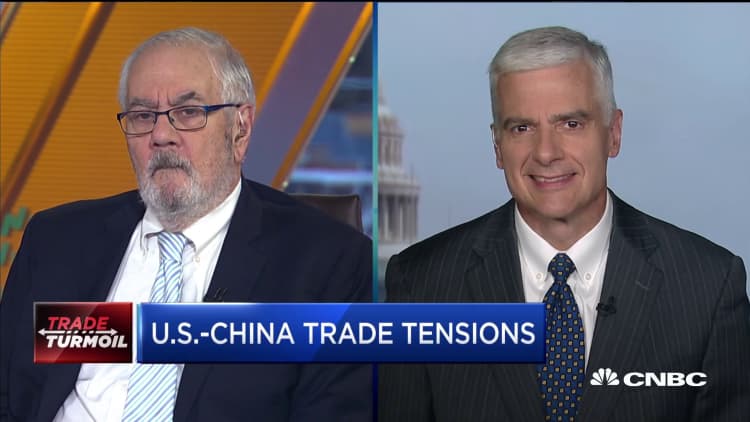
China is exploring more drastic action as a result of its trade fight with the U.S., according to the South China Morning Post.
While China is open to resuming trade talks, "government advisers are now highlighting the risk of sourcing critical supplies from an increasingly hostile US...and are exploring ways for the country to cut its exposure to the US," the paper said, citing Chinese researchers. The article was titled, "Donald Trump's trade war and Huawei ban push China to rethink economic ties with US."
And China is considering cutting natural gas purchases from the U.S. as part of this movement, the paper said.
"The idea that China should buy large amounts of natural gas from the U.S. must be revisited," Wang Yongzhong, a senior fellow at the Chinese Academy of Social Sciences, a governmental think tank, told the Hong Kong-based newspaper Monday.
The move came after President Donald Trump's latest action to blacklist Huawei, effectively halting its ability to buy American-made parts and components. China is now threatening to stop funding an industry that the two countries have done sizable deals in. In 2017, China agreed to fund a natural gas project in Alaska worth $43 billion, the South China Morning Post said.

"China may have to cap U.S. supplies at 10 or 15 percent of its overseas purchases for the sake of supply chain security," said Wang, who specializes in China's energy supply security. "What if the [energy] supply [including both liquefied natural gas and oil] is cut off suddenly, as we have seen in the Huawei case?"
China bought $6.3 billion worth of U.S. crude and LNG in 2017, 3.6% of the country's purchases of foreign energy products, the newspaper said, adding that China's reliance on U.S. energy products is "limited."
U.S. restrictions on Huawei had forced tech companies and chipmakers including Google and Qualcomm to cut ties with the Chinese telecom giant until the U.S. granted a 90-day license to keep existing networks online. The ban sparked a big sell-off in semiconductor stocks Monday.
Chinese President Xi Jinping ramped up his rhetoric on the trade war Monday by saying China is embarking on a "new Long March, and we must start all over again!"
The trade negotiations between the world's two largest countries have hit a roadblock after Trump followed through with his threat to increase tariffs on $200 billion in Chinese goods from 10% to 25%. China immediately responded by upping the tariffs on $60 billion of U.S. goods to as high as 25%.
— Click here to read the original story .


